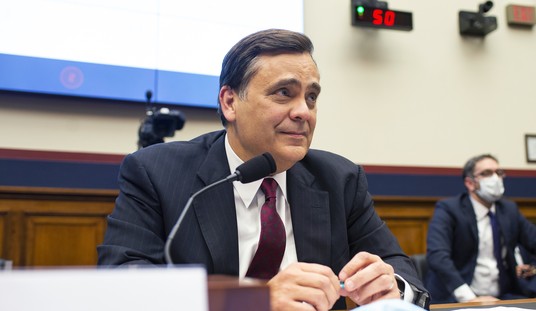During the year long ObamaCare debate, there was a spirited debate of the proposition that ObamaCare would cause rationing by the federal government of services and drugs. Government rationed health care services and drugs have evolved from rhetoric to reality.
On July 28th, Senator David Vitter (R-Louisiana) raised drug rationing concerns, because of a Food and Drug Administration (FDA) pending decision to take the cancer drug Avastin off the list of approved drugs for breast cancer. This example of rationing by the FDA of a drug to aid those with cancer is exactly what we should expect under an ObamaCare drug rationing regime.
According to Ben Evans, an AP reporter, in a “news article” that is supposed to be an unbiased news source:
Reviving allegations of government death panels, Sen. David Vitter of Louisiana said Wednesday that an FDA advisory panel’s negative recommendation on a contested breast cancer drug amounts to rationing health care. “I shudder at the thought of a government panel assigning a value to a day of a person’s life,” Vitter said in a press release about the drug Avastin. “It is sickening to think that care would be withheld from a patient simply because their life is not deemed valuable enough.”
Conservatives are seeing a trend by the left to play the “Death Panel” card as a means to disparage reasonable argument about rationing. The idea that ObamaCare may lead to rationing is close to reality and the Avastin example shows how ObamaCare cost-benefit analysis will hurt the sick. Senator Vitter never said the words “Death Panel,” yet the AP chose to, in essence, put those words in the mouth of Vitter to make the article more interesting and inflammatory. The Senator made an excellent point and many will use this example to push for repeal ObamaCare.
Senator Vitter wrote in a letter to Dr. Richard Pazdur, head of the FDA’s Office of Oncology Drug Product, that “based on a review of the FDA Advisory Committee’s report on Avastin no new safety concerns were raised with the drug. Rather the Committee’s concerns appear to have been based on cost effectiveness.” The FDA has a criteria to only approve “clinically meaningful” drugs. Senator Vitter’s concern is that cost is a factor in this ambiguous and vague standard. Adopting a de facto government run healthcare system will empower federal bureaucrats to make these types of arbitrary decisions on a mass basis for all Americans. Rationing is a fatal flaw with the intellectual underpinning of ObamaCare.
Vitter further argued:
The decision on whether a patient should use a possible life-extending drug is a decision that should be made solely between a doctor and patient, not a government panel. I find it outrageous that a government panel would put a price on those precious months for the families that are living through the trauma of a losing a mother, wife, sister, daughter, or aunt. Taking Avastin off-label for breast cancer treatment is essentially government rationing.
This is a reasonable argument, yet Vitter was hit by the AP for arguing that the Avastin example is evidence of “Death Panels.” Call it what you will, but either way people will be harmed by government bureaucrats making rationing decisions as individuals or on panels.
The FDA’s purpose is to protect people from food and drugs that are inherently unsafe or not effective. The idea that cost can be a factor in an FDA decision is outside of the FDA mission. Using cost as a means to ration care and drugs is the exact fear that many conservatives raised concerning the means that the government will use to cut corners and save money under ObamaCare. Avastin should be listed and approved if it lengthens the lives of cancer patients regardless of the drug’s cost.
Rationing is happening in Europe. Access to life extending drugs under the government run system in the United Kingdom is difficult. Reports that thousands of cancer patients face an early death because the National for Health and Clinical Excellence (NICE) rejected or only partially endorsed 15 new drugs has caused an uproar in the UK. Conservatives don’t want to see that flawed system imposed in the United States.
According to the Daily Mail:
The watchdog totally blocked a quarter of the cancer drugs made available since 2008 and heavily restricted others – despite Government promises to make more treatments available. Medicines rejected include bowel cancer drug Avastin and Nexavar- the only treatment offering any chance of survival for patients with advanced liver cancer.
David Cameron promised to reverse this rationing decisions because of the controversy. People suffering from cancer in the United States are similarly angered by the pending decision of the FDA about the same drug. Americans need to study the UK example so we don’t copy a flawed system that bars many lifesaving treatments and drugs for those who are ill because of cost. At least the Brits reversed a bad decision. Too bad the FDA has not indicated that they are having second thoughts about the drug. The Avastin example is of deep concern to those who want cancer patients to get what they need regardless of the cost.
According to Big Government:
In September, the Food and Drug Administration will try to take the anti-cancer drug Avastin “off-label.” Avastin is a Stage 4 drug used to battle breast cancer. Avastin is not a cure but has been shown to stop the growth of cancer for an average of five months — meaning some late stage breast cancer victims live beyond five months. But late stage breast cancer patients do not fit into the cost-benefit analysis of the Obama Administration. We told America rationing would happen if the healthcaretakeover bill passed and in September, women with breast cancer will be its first victims.
The FDA concedes that this drug will extend the lives of many who are afflicted with cancer, yet many are concerned that price may the deciding factor in the FDA’s pending decision to de-list the drug. If it is de-listed, then Medicare and private insurance companies will not cover the cost of these drugs. The worry is that this evidence of rationing with regard to those in the most need of these costly drugs.
Americans should be having a dispassionate debate on whether ObamaCare will lead to the mass rationing of care and drugs. The left loves to raise the term “Death Panels” because it distracts from the real issues with ObamaCare. Senator Vitter raised an important issue and the Avastin example is evidence of our future under the ObamaCare regime. A future of arbitrary decisions by federal bureaucrats and health care decisions based on cost.












Join the conversation as a VIP Member